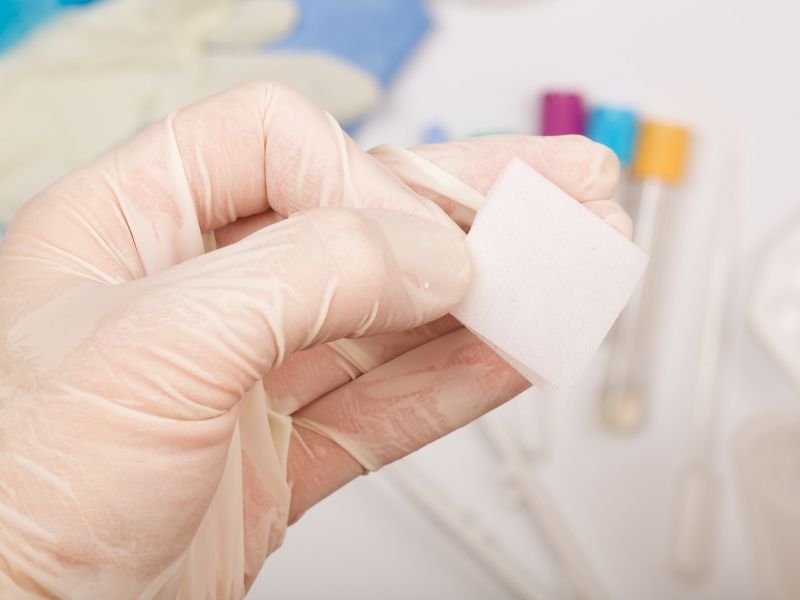Whether you’re looking to sanitize a wound, clean a surface, or disinfect your hands, antiseptic wipes vs alcohol wipes are two popular options. In this post, wipes manufacturer DHTI will show you the pros and cons of each type of wipe and the difference between antiseptic wipes and alcohol wipes.
Learn more: 10 best tissue wet wipes for babies and adults at the good price
1. Are antiseptic wipes vs alcohol wipes the same?
Antiseptic wipes vs alcohol wipes are not the same, although these two types of wipes are often used interchangeably for cleaning and disinfecting purposes. In fact, antiseptic wipes are commonly used to sanitize the skin and clean wounds. Meanwhile, alcohol wipes are designed to disinfect surfaces.

It is important to note that alcohol wipes should not be used on cuts and wounds, as they can cause stinging. To better understand the pros and cons of each option, let’s take a closer look at their characteristics.
Discover now: What are alcohol wipes used for? Benefits & How to use
2. Pros and cons of antiseptic wipes
Antiseptic wipes have both advantages and disadvantages, which are as follows:
Pros:
- Antiseptic wipes are used as a substitute for soap and water when cleaning your hands. This is especially useful when you cannot access clean water and soap while on the go.
- They are safe for children to remove dirt, kill bacteria, and disinfect their hands.
- It cleans car seats, restaurant surfaces, and public spaces. The use of antiseptic wipes makes public surfaces safer to touch and use.
- Antiseptic wipes effectively remove tough stains from clothes, such as smudges, food and sweat stains.

Cons:
- Antiseptic wipes can cause skin irritation in people with sensitive skin, leading to rashes, redness, and inflammation.
- It also blocks pores and limits excretion, which can lead to blackheads and other skin problems with prolonged use.
- They cause skin dehydration as they remove the natural oils, which may eventually cause a skin breakout if used for prolonged periods.
- The chemicals in antiseptic wipes can harm the delicate skin around the eyes.
- Most antiseptic wipes are made of plastic, which is not biodegradable and contributes to the increase of carbon footprint in the world.

See more: Can you clean your face with alcohol wipes? Here’s the truth
3. Pros and cons of alcohol wipes
Pros:
- Alcohol wipes effectiveness in killing bacteria, thanks to the high concentration of isopropyl alcohol.
- They are quick cleaning as alcohol has a high evaporation rate, effectively cleaning surfaces before drying off.
- Alcohol is non-corrosive. So, it’s a safe option to use in various settings like your home, office, or workshop without worrying about damaging surfaces or causing harm to the skin.
- Alcohol wipes are non-staining and helpful in cleaning stubborn smudges and marks on your workspace.
- Alcohol wipes material is biodegradable, which makes them more eco-friendly than antiseptic wipes.

Cons:
- Alcohol wipes can be harsh on the skin, especially if used frequently or on sensitive areas.
- They may not be effective against all types of germs, particularly spores and some viruses.
- It cannot be used to clean wounds directly as it can cause a stinging sensation. However, it can be used to clean the surrounding areas of the wound to prevent the growth of harmful bacteria.
- Alcohol is a highly flammable substance and should be kept away from any sources of ignition. Therefore, it is not recommended to use alcohol wipes in environments that involve fire hazards, such as cooking.
Find out: Can you use alcohol wipes on glasses? Reveal pros and cons
4. Other differences between alcohol wipes and antiseptic wipes
This is several other difference between antiseptic wipes and alcohol wipes.
Active ingredients:
Antiseptic wipes contain antibacterial agents or biocides. It is mainly composed of water-soluble quaternary ammonium compounds. Each piece of antiseptic wipe has a low chemical concentration.
Isopropyl is the chemical used in alcohol wipes, composed of isopropanol and 2-propanol. This chemical dissolves a wide range of polar and nonpolar stains, including light oils, fingerprints, cutting fluids, flux residues, carbon deposits, and mold releases. The usual ratio of isopropyl to water in alcohol wipes is 70:30.

Antiseptic wipes vs alcohol wipes have different primary uses.
Antiseptic wipes are commonly used to disinfect skin, equipment, and surfaces in a hospital setting. Antiseptic wipes work best on wet pathogens and are less effective on dry surfaces.
On the other hand, alcohol wipes can be used for cleaning optical surfaces such as glasses, fiber optic connectors, computer keyboards, and display screens. They also effectively remove oil, dust, and other contaminants from surfaces. However, alcohol wipes are not recommended for disinfecting wounds as they can cause stinging and irritation.
Cleaning wounds
Antiseptic wipes are an excellent option for cleaning wounds, scrapes, and cuts, as they are gentle and medically approved. They sterilize wounds and the surrounding areas, quickening the healing process and limiting the spread of bacteria. On the other hand, alcohol wipes can only be used to clean the areas around wounds as alcohol stings when poured on open wounds.

Safety issues
Antiseptic wipes can cause skin breakouts and clog pores, leading to blackheads and dryness. They contain dangerous chemicals if ingested. We should cautiously use it around the eyes and keep it out of reach of children due to harmful chemicals.
Although considered safe when handled properly, alcohol wipes are highly flammable and require caution during use. They should be kept away from children, especially in areas with a high risk of fire or sparks. Direct ingesting isopropyl can be harmful, and seeking prompt medical assistance is crucial.
Fabric
The difference between antiseptic and alcohol wipes is the materials used to make them. Antiseptic wipes are typically made of plastic polymers that are non-biodegradable. On the other hand, alcohol wipes can be made of either plastic-based materials or biodegradable non-woven fabrics. If you are environmentally conscious, alcohol wipes made of biodegradable non-woven fabric are the better option.
In conclusion, both antiseptic wipes vs alcohol wipes have their advantages and disadvantages. The choice between two types of wipes will depend on the specific situation and intended use. It is essential to read and follow the instructions on the packaging carefully to ensure proper use and effectiveness. For further details, contact us:
Dong Hiep Trading and Investment Joint Stock Company:
- Representative office: 69B Thuy Khue, Thuy Khue Ward, Tay Ho District, Ha Noi City.
- Manufacturing site: Lot CN7, Tu Liem Industrial Cluster, Minh Khai Ward, Bac Tu Liem District, Ha Noi City.
- Hotline: (84-24) 3716 0270.
- Website: https://dhti.vn/en/
You may like:




